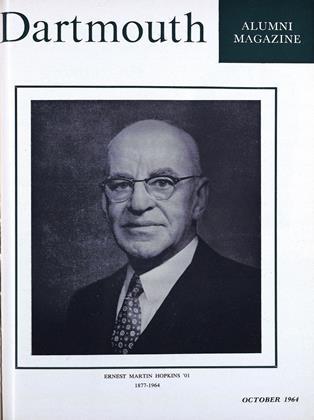IN an address delivered at the inauguration of his brother, Louis B. Hopkins 'OB, as President of Wabash College in 1926, Mr. Hopkins had this to say about being a college president:
"Ceremony has its useful place, and form ought not to be ignored as an influence toward orderly and dignified procedure. To the extent that either cere- mony or form tends to dehumanize or to make impersonal the work of a college president, however, it should be held to be anathema. ...
"The penalty of those men who enter understandingly upon educational work in various capacities is that, whatever may be true of other men, they can allow themselves contentment with no narrow view and can feel ambition satisfied with no small accomplishment. The rewards sufficient for little minds and petty souls must forever be forsworn by them. The criterion of value by which men in many another field of activity adjudge themselves successful can never be theirs. ...
"It is a tantalizing, elusive, but challenging opportunity to which you have pledged yourself. The past is important as bearing upon the present, and the present is important for the light it may shed on the future. But the work of the college is always fundamentally for the benefit of a tomorrow about whose circumstances we can but inadequately know.
"Herein lie the difficulties of college administration. An institution tends to be stationary when it ought to be galvanized. It tends to hold back when it should go ahead. It tends to be cautious when it should be bold. The offsets to these tendencies must be provided by personal initiative and individual influence of the men who man it.
"The college which is overcautious in its method or overfearful of making a mistake in its policy withers intellectually and dies spiritually even more promptly than the college which is guilty of mistaken boldness suffers grievous harm. Progress should be unceasingly sought, though with understanding that the advantages of evolution as a working theory, over revolution, are nowhere more obvious than in the development of educational policy. ...
"Participation in college work is a task to be undertaken joyfully, in happiness at the association it offers, in gratification at the ideals which govern it, and in elation at the range of territory yet unsubdued over which dominion may be acquired. The tears of Alexander for lack of new worlds to conquer can never be shed by the college teacher or by the college administrator."
 View Full Issue
View Full Issue
More From This Issue
-
 Feature
FeatureThe Hopkins Administration Steps Forward as a National
October 1964 -
 Feature
FeatureSome Hopkins Views on Higher Education
October 1964 -
 Feature
FeatureA.B.C. Project and Students Both Measure Up to High Expectations
October 1964 -
 Feature
FeatureThe End of a Dartmouth Era
October 1964 -
 Feature
Feature"This Considerate, Friendly Personality"
October 1964 -
 Article
ArticleTHE FACULTY
October 1964 By GEORGE O'CONNELL







